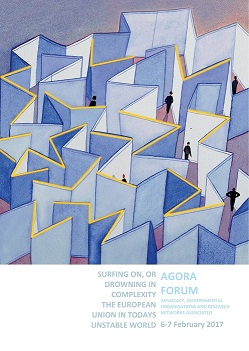Kick-off Instigation AGORA Forum
09:00 - 16:00
@ ULB, Brussels
Add to calendar“SURFING ON OR DROWNING IN COMPLEXITY – THE EUROPEAN UNION IN TODAY’S UNSTABLE WORLD”
The first Forum of the GEM-STONES project was set-up to facilitate the integration of the GEM-STONES’ four research work-package teams, and to broaden the project’s internal scientific dialogues with input from third parties and other communities.
On the first day of the Forum, the GEM-STONES doctoral fellows visited the McKinsey Solutions and Knowledge Center, and attended a meeting of the Committee on Economic and Monetary Affairs (ECON) at the European Parliament. The fellows also drafted and discussed critical reviews of a set of chapters drawn from the edited volume on “Globalisation, Multilateralism, Europe: Towards a Better Global Governance?” [Telò, 2013 : Routledge], and participated in special research dialogues organised at the Institut d’Études Européennes.
On the second day of the Forum, a diverse community of academics, researchers, officials and representatives from civil society organisations came together for roundtable discussions on the EU's competencies in managing increasing global instability and complexity.
Roundtable 1 “The European Union in a Global World: Institutionalisation in the Face of Complexity”
Chair: Prof.Dr. Florian Trauner (Vrije Universiteit Brussel)
Roundtable 2 “The European Union in a Global World: Networking in the Face of Complexity”
Chair: Prof. Amandine Crespy (Université Libre de Bruxelles)
Roundtable 3 “The European Union in a Global World: Interregionalism in the Face of Complexity”
Chair: Prof. Mario Telò (Université Libre de Bruxelles & LUISS Guido Carli di Roma)
Roundtable 4 “The European Union in a Global World: Policy Framing in the Face of Complexity”
Chair: Prof. Nicolas Levrat (Université de Genève)

















